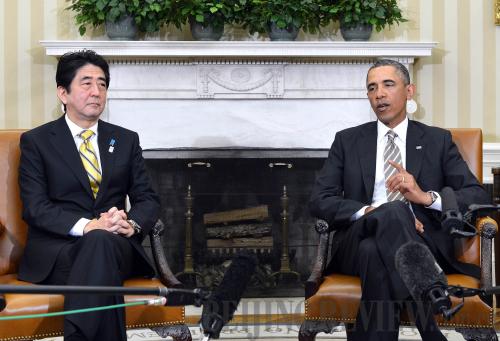|
 |
|
ONE-SIDED TALK: U.S. President Barack Obama speaks while Japanese Prime Minister Shinzo Abe listens, at a press conference following their meeting in the Oval Office at the White House in Washington, D.C., on February 22 (XINHUA/AFP) |
Japanese Prime Minister Shinzo Abe was finally invited to the White House in late February. But his long-awaited Washington trip did not culminate with a satisfying souvenir to take home. He failed to get what he wanted from the United States on the Diaoyu Islands issue, but promised to sign the Trans-Pacific Partnership (TPP) agreement, which is still controversial in Japan.
The United States is aware that its current interest is not to be whirled into a dispute over which it is not directly concerned, but to realize instead the practical benefit of economic cooperation in a peaceful regional environment. If Tokyo understands the principle as Washington does, it will return to the track of reviving the country's economy through active and peaceful regional cooperation and cease making a scene over territorial disputes with its neighbors.
Limited outcomes
Abe's three-day visit to the United States took place in late February. The Japanese prime minister and reelected U.S. President Barack Obama met on February 22 to discuss a wide range of security and economic issues in their first meeting after each assumed office. Previously, Abe planned to visit the United States right after he took office in late December 2012, but the meeting was turned down.
Abe's Washington trip was more about symbolic meaning than practical outcomes, said Pang Zhongpeng, a researcher on Japanese studies with the Chinese Academy of Social Sciences (CASS).
The two leaders spoke about the U.S.-Japan alliance, the TPP and the nuclear program on the Korean Peninsula. However, at a press conference following their meeting, Obama avoided the Diaoyu Islands issue, which Abe considered the top agenda item of his visit.
Obama did reiterate that the U.S.-Japan alliance was the "central foundation for our regional security and so much of what we do in the Pacific region," but stopped short of mentioning the Japan-China dispute over the Diaoyu Islands in his brief remarks after his meeting with Abe. Obama highlighted the two countries' concerns on the "provocative actions" taken by the Democratic People's Republic of Korea, namely Pyongyang's recent nuclear test, vowing to take "strong actions."
"Obama's remarks were more like face-giving comfort than steady support," said Pang. He explained that the U.S. side didn't make firm promises on either the nuclear issue on the Korean Peninsula, nor the U.S. military presence in Futenma, which has been a problem between Tokyo and Washington for many years.
Before his visit, Abe stressed that he intended to show Asian countries the rebounded close ties between Japan and the United States. For Abe, the U.S. attitude on the alliance has at least fulfilled one of Japan's targets. "As a result of our discussion, we were able to share our understanding on not just concrete policy, but on the direction in which our alliance is headed," said Abe after meeting with Obama, claiming that "the trust and the bond" in the U.S.-Japan alliance are "back." Abe added that "one big theme" of the meeting was to discuss "strengthening the alliance between Japan and the United States."
| 